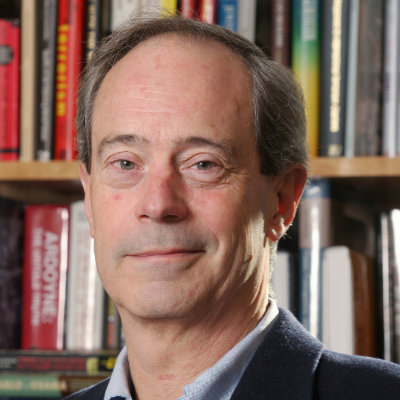Clark R. McCauley

Department/Subdepartment
Education
Ph.D., University of Pennsylvania
B.A., Providence College
Areas of Focus
Psychology of group identification; group dynamics and intergroup conflict; the psychological foundations of ethnic conflict and genocide
Biography
Clark McCauley (B.S. Biology, Providence College, 1965; Ph.D. Social Psychology, University of Pennsylvania, 1970) is Research Professor of Psychology at Bryn Mawr College. His research interests include stereotypes, group dynamics, and the psychological foundations of ethnic conflict, terrorism, and genocide. He is co-author of Why Not Kill Them All? The Logic and Prevention of Mass Political Murder (2006), co-author of Friction: How Radicalization Happens to Them and Us (2011, second edition 2017), co-author of The Marvel of Martyrdom: The Power of Self-Sacrifice in a Selfish World (2019), co-author of Radicalization to Terrorism: What Everyone Needs to Know (2020), and Founding Editor emeritus of the journal Dynamics of Asymmetric Conflict: Pathways toward Terrorism and Genocide.
Other Research Interests
- What does it mean to essentialize a group, our own or others, and how does essentializing enable killing by category?
- What is the role of emotions (disgust, humiliation, anger) in intergroup conflict, and what is the relation between interpersonal emotions and intergroup emotions?
- How can polling be used to track variation over time in support for terrorism?
- What are the mechanisms of radicalization that can move normal human beings to terrorism, that is, to killing civilians in intergroup conflict?
Courses
- Social Psychology 208
- Psychological Measurement and Testing 305
- Ethnic Conflict 358
- Cognitive Issues in Personality and Social Psychology 398
Selected Publications
Pavloik, T., Moskalenko, S., & McCauley, C. (2021). Bifactor analyses provide uncorrelated measures of activism intentions and radicalism intentions. Dynamics of Asymmetric Conflict. DOI 10.1080/17467586.2021.1980220.
Leuprecht, C., Skillicorn, D. B. & McCauley, C. (2020). Terrorists, radicals, and activists: Distinguishing between countering violent extremism and preventing extremist violence, and why it matters. In Steffanie von Hlatky (ed.), Countering violent extremism and terrorism: Assessing domestic and international strategies, pp. 18-46. Montreal & Kingston, Canada: McGill-Queens University Press.
McCauley, C. (2020). Chapter 6. ‘Killing them to save us’: Lessons from politicide for preventing and countering terrorism. In Alex P. Schmid (ed.), Handbook of Terrorism Prevention and Preparedness, pp. 144-172. The Hague, NL: ICCT Press.
McCauley, C. (2020). The essence of hate and love. In R. J. Sternberg (ed.), Perspectives on hate: How it originates, develops, manifests, and spreads, pp. 43-64. Washington, D.C.: APA Books.
McCauley, C. (2020). The ABC model: Commentary from the perspective of the Two Pyramids model of radicalization. Terrorism and Political Violence. DOI: 10.1080/09546553.2020.1763964.
McCauley, C., & Moskalenko, S. (2016). Fear and anger elicited by terrorist attack: The power of jujitsu politics. In J. Giordano, S. Rhem, & G. Popp (Eds.), White paper assessing and anticipating threats to US security interests, pp. 68-72. Washington, D.C.: A Strategic Multi-Layer (SMA) Periodic Publication. [PDF]
McCauley, C. (2016), What comes after ISIS? A peace proposal. Perspectives on Terrorism, 10(4), 64-68.
McCauley, C., & Moskalenko, S. (2017). “Results of 28 October-8 November 2016 Internet Poll of 216 U.S. Muslims: Opinions about ISIS and the War in Syria; about the 2016 U.S. presidential election; and about the Syrian refugee crisis,” Report to the Office of University Programs, Science and Technology Directorate, U.S. Department of Homeland Security. College Park, MD: START.
Fajmonova, V., Moskalenko, S., & McCauley, C. (2017). Tracking radical opinions in polls of U.S. Muslims. Perspectives on Terrorism, 11(2).
McCauley, C. (2018). Explaining homegrown Western jihadists: The importance of Western foreign policy. International Journal of Conflict and Violence, 12, 1-10. doi: 10.4119/UNIBI/ijcv.643 [PDF]
McCauley, Clark and Scheckter, Sarah. (2008) What's Special about U.S. Muslims? The War on Terrorism as Seen by Muslims in the United States, Morocco, Egypt, Pakistan, and Indonesia. Studies in Conflict & Terrorism, 31:11, 973 — 980 [PDF]
McCauley, Clark and Stellar, Jennifer. (2009). U.S. Muslims after 9/11: Poll Trends 2001-2007. Perspectives on Terrorism, 3:3, 35 - 47 [PDF]
McCauley, Clark and Moskalenko, Sophia. (2010). Individual and Group Mechanisms of Radicalization. Current Multi-Disciplinary Perspectives on Root Causes, the Role of Ideology, and Programs for Counter Radicalisation and Disengagement, 82 - 91 [PDF]
Leuprecht, C., Hataley, T., Moskalenko, S., and McCauley, C. (2009). Winning the Battle but Losing the War? Narrative and Counter-Narratives Strategy. Perspectives on Terrorism, 3:2, 25 - 35 [PDF]
McCauley, Clark. (2009). War versus criminal justice in response to terrorism: the losing logic of torture. In W. G.K. Stritzke, S. Lewandowsky, D. Denemark, J. Clare, & F.Morgan (Eds.) Terrorism and Torture: An Interdisciplinary Perspective (pp. 63-85) [PDF]
McCauley, Clark and Scheckter, Sarah (2010) Reactions to the war on terrorism: Origin-group differences in the 2007 Pew poll of U.S. Muslims. [DOC]
McCauley, C. (2024). Mass political murder: What and where is the hate? Advances in Political Psychology. https://doi.org/10.1111/pops.13013.
McCauley, C. (2024). Research Note: The role of ideas in radicalization to terrorism: Ideology and narrative vs. diagnostic, prognostic, and motivational action frames. Journal for Deradicalization, 38, 211–237.
Moskalenko, S., Freilich, J., Chermak, S., Gruenewald, J., & McCauley, C. (2023). Growth opportunities in American and British terrorism research. Dynamics of Asymmetric Conflict, 16(1), 44–69.
Pavlović, T., Moskalenko, S., & McCauley, C. (2022). Two Classes of Political Activists: Evidence from Surveys of U.S. College Students and U.S. Prisoners. Behavioral Sciences of Terrorism and Political Aggression, 16(2), 227–247. https://doi.org/10.1080/19434472.2022.2064894
For a copy of other publications, please click here.